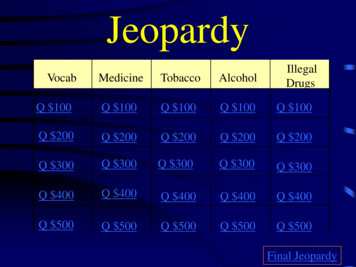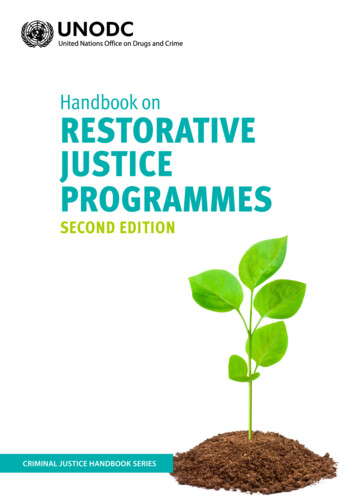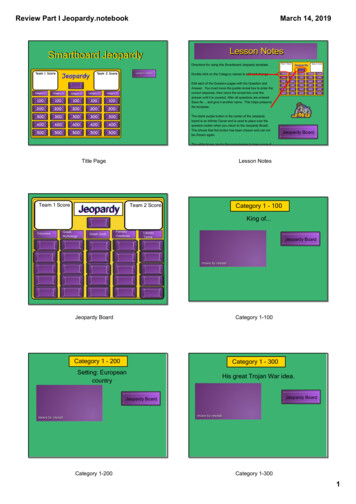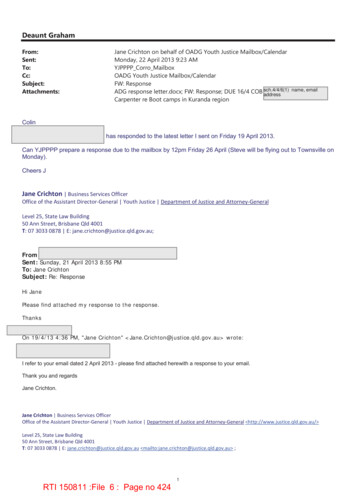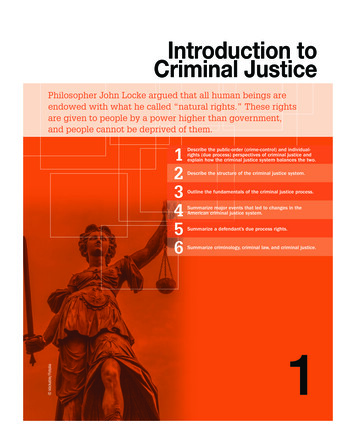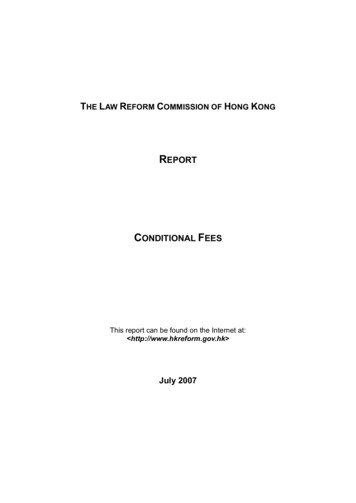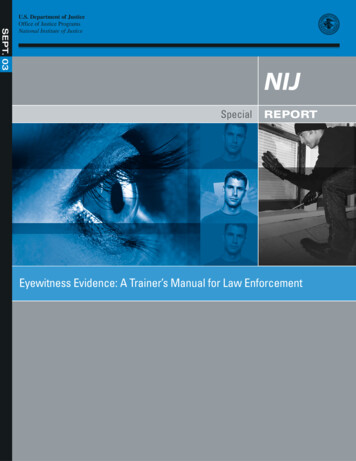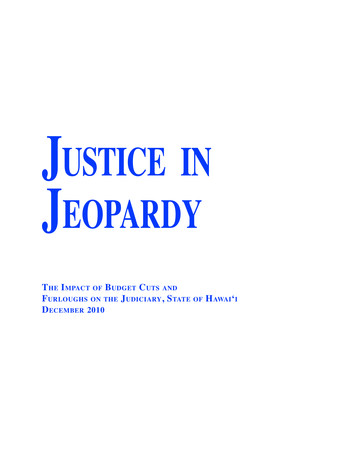
Transcription
JUSTICE INJEOPARDYT HE I MPACT OF B UDGET C UTS ANDF URLOUGHS ON THE J UDICIARY , S TATED ECEMBER 2010OFH AWAI ‘ I
T ABLET ABLEOFOFC ONTENTSC ONTENTSA Message from Chief Justice Mark Recktenwald . 1Hawai‘i State Courts at Work . 2Judiciary General Fund Appropriation . 6Hawai‘i State Judiciary Expenses. 8Judiciary Budget Reductions . 10Specific Budget Impacts on the Courts . 12
JUSTICE IN JEOPARDYPAGE 1A MESSAGE FROM CHIEF JUSTICE MARK RECKTENWALDThese have been difficult economic times for all of Hawai‘i, and the Judiciary has been noexception. In the last two years, the Hawai‘i State Judiciary’s general fund appropriation hasbeen reduced by 19.7 million (or 13.1% of its overall budget), while demand for Judiciaryservices has increased due to the impact of the difficult economy on our citizens. Furloughsalone have eliminated over 600,000 available staff hours of work.These reductions have had substantial negative effects throughout the judicial system, byreducing, delaying and in some cases eliminating important services. Notably, Hawaii’sfamilies and most vulnerable citizens have been significantly impacted. The time it takes toprocess an uncontested divorce has doubled, and the wait time for children to participate inthe Judiciary’s Kids First program in Kapolei, which seeks to alleviate the impacts of divorceby having children participate in a group counseling session, has more than doubled.Budgetary reductions have also had negative effects in criminal cases. For example, 24 adultprobation positions were eliminated in the First Circuit, including positions in high risk areassuch as the sex offender unit and the domestic violence unit. Individual probation officersnow supervise as many as 180 defendants, well above the nationally recommended ratio.Justice has been delayed in civil cases as well. From FY2008 through FY2010, the medianage of pending Circuit Court civil cases has increased by more than 40 percent. By delayingthe time it takes to resolve civil disputes, the cost and uncertainty of litigation increases andour community’s efforts at economic recovery are hindered.Finally, the Judiciary’s programs and services can save the public money in the long run. Thecost of supervising a criminal defendant in the HOPE probation program, or providing intensivesupervision and treatment through programs such as drug court, is far less than the 137/daythat it costs to incarcerate a defendant.This report highlights some of the impacts that furloughs and budget cuts have had on theJudiciary’s ability to fulfill its mission “to administer justice in an impartial, efficient, andaccessible manner in accordance with the law.”Adequately funding the state court system is an investment in justice, and an investment inour democracy, that should not be compromised even during tough economic times.Mark E. RecktenwaldChief Justice
JUSTICE IN JEOPARDYPAGE 2HAWAI‘I STATE COURTS AT WORKThe Hawai‘i State Judiciary resolves a wide-range of disputes facing our local community.CIVIL JUSTICEHawai‘i residents and businesses rely on the courts to fairly resolve their civil conflicts.In FY2010, the Judiciary was involved with: 600,835 non-criminal traffic cases 60,575 District Court civil cases including: 44,292 Regular Claims Division cases (claims between 3,500 - 25,000) 6,141 Small Claims Division cases (claims less than 3,500) 37,251 Circuit Court civil proceedings including: 14,090 condemnation, contract and personal injury cases 8,736 probate proceedings 6,938 conservatorship and guardianship proceedings 1,422 trust proceedings 6,065 land court, tax appeal and mechanic’s lien cases“It is time to ensure that, in a country founded on the rule of law and the principleof access to justice, our judicial branch does not wither under the burden offinancial stress.It is time for our lawmakers to recognize the value of our judicialbranch as more than a line item in a budget. A strong judicial branch is essential tomaintaining responsible government and protecting citizens’ rights.”– Stephen N. Zack, President of the American Bar Association
JUSTICE IN JEOPARDYPAGE 3CRIMINAL JUSTICEThe Judiciary strives to expeditiously and fairly adjudicate or resolve all criminal matters. InFY2010, the Judiciary was involved with: 68,041 criminal traffic cases including: 13,593 DWI/DUI cases 1,264 reckless driving cases 94,479 District Court criminal casesincluding: 17,220 Circuit Court criminal casesincluding: 178 murder & manslaughter cases 97 forcible rape cases 1,602 aggravated assault cases 1,235 burglary cases 9,413 larceny/theft cases 2,686 larceny/theft cases 6,154 assault cases 3,633 narcotics cases 2,169 vandalism cases 1,349 prostitution cases 4,096 narcotics cases 1,232 sex offense cases“[A]s a practicing litigator, I can share with you the impact that thebudget cuts on the Judiciary have caused. Among my case load, Ihave a case that is about four years old that has been ready to go totrial since late last year. It has been delayed because of the backlogof criminal trials and was recently reset to [redacted], 2011 - a yearaway. Many of my colleagues are reporting similar occurrences.The Judiciary allows economic, political and social life to functionproperly and it must be spared any further budget cuts.”- An attorney in private practice
JUSTICE IN JEOPARDYPAGE 4FAMILY COURTThe Family Court hears all legal matters involving children, such as delinquency, waiver ofjurisdiction, status offenses, abuse and neglect, termination of parental rights, adoption,guardianships, and detention. The Family Court also hears domestic relations cases, includingdivorce, domestic violence, temporary restraining order, nonsupport, paternity, and uniform childcustody jurisdiction cases. In FY2010, the Family Court workload involved: 57,696 Family Court proceedings including: 10,761 divorces 5,150 domestic abuse protective orders 1,604 child abuse and neglect cases 926 adoptions 3,674 paternity cases 1,557 foster custody cases 2,326 juvenile probation cases“As a current participant, the Family Drug Court program has helped me dothings I never thought I could do. I have learned the skills I need to remainclean and sober for the rest of my life.Without the support and instructiongiven to me by the Family Drug Court, I would not have the hope I have inmy life today, and I am currently on the path to being reunified with mychildren. I will continue to battle this disease of addiction with the skills theFamily Drug Court has armed me with and my children will never return tothe foster care system.”- Family Drug Court participant
JUSTICE IN JEOPARDYPAGE 5TREATMENT COURTSMany criminal defendants have substance abuse and/or mental health issues. When appropriate,the Judiciary provides these defendants with probation and treatment in lieu of incarceration.Treatment can help defendants live a clean and sober life, allowing them to reunite with theirfamilies and become productive citizens. In FY2010, the Judiciary’s treatment courts served1,085 clients statewide. The strength of the treatment courts lies in their ability to lowerrecidivism rates and costs to the State of Hawai‘i. Less recidivism means less court andincarceration costs. Hawaii’s Adult Drug Courts have an average recidivism rate of about 8percent as opposed to a recidivism rate of 50 percent for those persons on general probation.The cost of treatment in these courts averages about 5,000 per client per year as opposed to acost of about 50,000 per year for incarceration.PROBATIONMost convicted criminal defendants are sentenced to probation in lieu of or in addition toincarceration. The Judiciary supervises probationers to reduce recidivism and encourage therehabilitation and reintegration of these individuals into the community. In FY2009, theJudiciary’s 129 probation officers supervised: 20,586 probationers 23,534 cases“It makes social and economic sense to provide treatment rather thanincarceration when appropriate. Treatment courts, besides being costeffective, are a major tool in breaking the cycles of substance abuse,domestic violence and many other social issues facing our state.”- Dee Dee Letts, Treatment Court Coordinator“Due to the limited number of slots available, we have a waiting list toget into Mental Health Court. There are not enough resources in thecommunity for treatment and housing which puts defendants andcommunity at risk.”- Louise Crum , First Circuit, Adult Client Services, Mental Health Court
JUSTICE IN JEOPARDYPAGE 6JUDICIARY GENERAL FUND APPROPRIATIONThe Judiciary’s Hawai‘i general fund appropriation is its most important funding source,accounting for over 90 percent of its funding. The Judiciary receives less than three percentof Hawaii’s general fund appropriations.“The Legal Documents Branch of the Circuit Court on O‘ahu receives, filesand processes, on average per year, approximately 300,000 originaldocuments, depositions, and exhibits (approximately 116,000 Family Court,80,000 criminal and Family Court criminal, and 104,000 civil documents,depositions, and exhibits).”- Lori Okita, First Circuit, Legal Documents Branch 1
JUSTICE IN JEOPARDYPAGE 7
JUSTICE IN JEOPARDYPAGE 8HAWAI‘I STATE JUDICIARY EXPENSESThe Judiciary uses its general fund appropriation to pay its 1,900 employees, operate its 21facilities, and provide court services to thousands of Hawai‘i residents each year.“Our greatest concern is that the furloughs negatively impact our system’sresponse/coordination of cases involving children who are alleged victimsof abuse or who are witnesses to crime. For example, delays in schedulingforensic interviews of these young victims and witnesses may result inconcern for their safety. Justice may not be served for the crimes.”- Jasmine Mau-Mukai, Children’s Justice Centers of Hawai‘i
JUSTICE IN JEOPARDYPAGE 9“The ‘Achieving Access to Justice for Hawaii’s People: The 2007 Assessmentof Civil Legal Needs and Barriers to Low- and Moderate-Income People inHawaii Report’ found that due to a lack of resources, legal service providersare able to assist only one of three of those who seek their help. Since 2007 ithas only gotten worse, resulting in more persons appearing in court withoutrepresentation. Greater resources are required from the Judiciary to assistthese persons to navigate the court system.”- Judge Daniel Foley, Chair, Access to Justice Commission
JUSTICE IN JEOPARDYPAGE 10JUDICIARY BUDGET REDUCTIONSFY2009 Judiciary’s general fund appropriation was 150.5 million The Legislature applied a 7 percent reduction (about 1 million) in discretionary costs tothe Judiciary’s core budget base The Legislature provided Capital Improvement Program (CIP) funding of about 13.8million The Legislature took 1 million from the Computer System Special Fund to help balancethe state general fund budget deficitFY2010 Judiciary’s general fund appropriation was reduced to 139 million, 11.5 million lowerthan in FY2009 The Judiciary initiated furloughs for its employees The Legislature reduced the salaries of state judges by 5 percent The Legislature eliminated 79 vacant positions The Legislature authorized 2 million and 22 positions to staff the Kapolei JudiciaryComplex The Legislature provided a one-time 2.5 million ceiling increase for the ComputerSystem Special Fund The Legislature provided CIP funding of about 9.8 millionFY2011 Judiciary’s general fund appropriation was reduced to 130.7 million, an 8.3 millionreduction from FY2010 No CIP funding was provided as the Legislature indicated it would wait for the results ofthe Judiciary’s Facilities Master Plan Study The Legislature allocated an additional 2.5 million to the Judiciary for domesticviolence ( 1 million) and legal/treatment service providers ( 1.5 million) The Legislature authorized the transfer of 2 million in funds from the Computer SystemSpecial Fund and 1.5 million from the Drivers Education Fund to the general fund
JUSTICE IN JEOPARDYPAGE 11“We are unable to keep up with the demands and backlogs that occur inalmost every area due to lack of manpower resources. The lawenforcement divisions work 24/7 and are making arrests and issuingcitations around the clock. With the economic downturn, there are morelawsuits being filed thereby increasing the courts’ caseloads. There aretwo less work days a month due to the furloughs; however, the workloadhas increased.”- Iris Murayama, First Circuit Court, Deputy Chief Court Administrator
JUSTICE IN JEOPARDYPAGE 12SPECIFIC BUDGET IMPACTS ON THE COURTSJUSTICE DELAYED From FY2008 through FY2010, there was a 28.4 percent increase in pending CircuitCourt civil actions and a 19.6 percent increase in the number of cases filed. Since thebudget cuts and furloughs, the median age of pending Circuit Court civil cases increasedby 41.8 percent. From FY2008 through FY2010, the number of pending court foreclosure cases increasedby 80 percent. The median age of pending foreclosure cases increased by 44 percent. From FY2008 through FY2010, there was a 98.2 percent increase in pending DistrictCourt civil actions and a 36.4 percent increase in the number of cases filed. At the District Court of the First Circuit, furloughs and position reductions have resultedin substantial delays in scheduling hearings and trials. Traffic and DUI trials typicallytook 1-2 months to be heard prior to furloughs and now take 4-5 months to schedule.Trials in regular claims cases were scheduled within two weeks prior to the furloughs butnow take 4-6 weeks to schedule. In the Family Court of the First Circuit, the time it takes to process an uncontesteddivorce has increased from 3-4 weeks, to 6-8 weeks since furloughs and budget cutswere implemented. The wait to schedule a mandatory session with the Judiciary’s KidsFirst program in Kapolei has increased from 4 weeks up to 10 weeks. Filing for divorcecan be the start of a traumatic process for a child that may involve physical relocation, anew school, financial insecurity and the inability to see one parent. Delays in processingdivorce cases increase the stress that children experience.“The judiciary is currently on a two day per month furlough system where, inaddition to state holidays, the courts close for two workdays per month. Two daysequate to 16 hours per month of court time. On Oahu, there are approximately 12circuit court criminal divisions. As a result, the furloughs result in about 192hours of lost court time per month for the circuit court criminal calendar on Oahu.Conservatively speaking, that time could accommodate approximately 8 averagelength criminal jury trials, 192 evidentiary motions, 384 plea hearings or 576 nonevidentiary motions. This is an illustration of the very direct and seriousconsequences that budget shortfalls are having on the criminal justice system.”- John M. Tonaki, Office of the Public Defender
JUSTICE IN JEOPARDYPAGE 13MORE SELF-REPRESENTED LITIGANTS More Hawai‘i residents are entering the court system without the benefit of an attorney.Even with reduced hours and resources, the Judiciary’s Ho‘okele service centers onO‘ahu assisted 103,009 self-represented litigants in 2009, a 5.6 percent increase from theyear before. The Fifth Circuit Service Center in Lihue opened in March 2008 to assist selfrepresented litigants with court forms and questions about court procedures. It wasclosed in December 2008 due to staffing shortages.COURT SERVICES REDUCED In 2005, the Honolulu Traffic Violations Bureau was open five nights a week to serve thepublic after working hours. It is only open one night a week now. In the near future, itwill probably close at night altogether, requiring more non-criminal defendants to takeoff from work to resolve their cases. Due to a staffing shortage by the Department of Public Safety’s Sheriff Division, therewere not enough sheriffs to provide security for Judiciary facilities on the Big Island.The Judiciary was forced to close the North Kohala, Hamakua, and Ka‘u rural courts inOctober 2010, requiring court customers to make a 20-60 minute drive to a courthouse.“Increasing numbers of self-represented litigants in civil cases receive lessin terms of court services because they are often disadvantaged due to lackof education, language barriers, and/or sometimes suffer from mentalhealth issues.”- Judge Barbara Richardson, Deputy Chief Judge, District Court
JUSTICE IN JEOPARDYPAGE 14PROBATION STAFFING ELIMINATED In the Client Services Division of the First Circuit, 24 positions were lost last year dueto budget cuts, including positions in both the Sex Offender Unit and the DomesticViolence Unit. These units work with some of the most dangerous offenders who are ata higher risk than others to recidivate. According to the American Probation and ParoleAssociation, the caseload standard is 30:1 to 120:1 depending on the risk level of theprobationer. In Hawai‘i, the ratio of cases to probation officers is as high as 180:1. Furloughs also are affecting public safety. Our probation officers have 24 fewer days ayear to supervise offenders. As a result, revocations of probation are being delayed, andprobation officers are unable to provide the level of supervision necessary for certainclients because there are fewer hours in the week to monitor the same, or increasing,numbers of probation clients.EFFECT ON FAMILIES AND VICTIMS To efficiently use public funds, the Judiciary contracts with external entities to provideservices that are not performed internally. These contracts were cut by more than 2.8million in FY2010 to balance the Judiciary budget. The contracts involve the purchaseof assessment and/or treatment services for substance abuse, child sex abuse, andmental health, as well as domestic violence emergency shelter services, juvenile clientand family services, anger management, victim impact classes, and more. The reduction in purchase of service (POS) contracts has resulted in fewer socialservices for crime victims. For example, reduced Judiciary funding of CatholicCharities Hawai‘i in FY2010 resulted in the loss of two positions which led to 165fewer child sexual abuse clients being served compared to the previous year. Cutting treatment court budgets has resulted in taxpayers having to pay more, not less.As a result of the budget cuts, 5 of the 11 treatment courts have waitlists for admittancedue to a reduction in the programs’ capacity. Many people on a waitlist are incarceratedat a cost of 137 per day to taxpayers as compared to about 14 a day when they are ina treatment court.
JUSTICE IN JEOPARDYPAGE 15 In FY2010, the Judiciary’s Maui/Moloka‘i Drug Court program lost four full-timeequivalent (FTE) positions after it had its annual allocation cut over 420,000. There isnow at least a 13-month wait for men to receive drug treatment services on Maui. Thewait for treatment was already between 8 and 12 months in May 2008 when theLegislature authorized four FTE positions to reduce the delay. Due to budget cuts, the O‘ahu Adult Drug Court has had to reduce electronic and voicemonitoring of clients by 30 percent. Since monitoring is used to ensure clients’compliance with curfew restrictions, the decrease in monitoring reduces communitysafety and increases the likelihood of clients relapsing. Furthermore, the court lackssufficient funding to accept new clients who need residential treatment after March 2011until the start of the next fiscal year. The budget cuts forced a reduction to the Judiciary’s POS contract for mediation andother dispute resolution services. The Mediation Centers of Hawai‘i are now expectedto provide services for approximately 3,100 cases, as opposed to 4,000 prior to thereduction in the contract amount for the POS. Mediation is provided in many types ofcases including domestic and family, landlord/tenant, temporary restraining orders, andneighbor disputes.“I felt all was lost and no one could help let alone begin to understand thedifficulties I was facing. It is because of Girls Court that I now know that Iam not alone.Help had finally arrived.I do not wish to imagine what ourlives would be like had Girls Court not intervened. I implore thatadditional funding be granted so that this program may continue its vitalwork in helping young ladies and their families.”- Girls Court participant
JUSTICE IN JEOPARDY PAGE 5 TREATMENT COURTS Many criminal defendants have substance abuse and/or mental health issues. When appropriate, the Judiciary provides these defendants with probation and treatment in lieu of incarceration. Treatment can help defendants live a clean and sober life, allowing them to reunite with their
